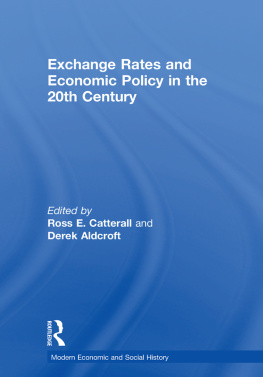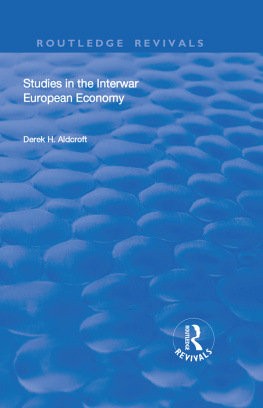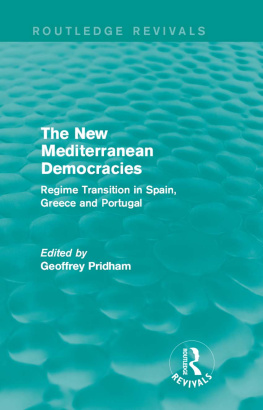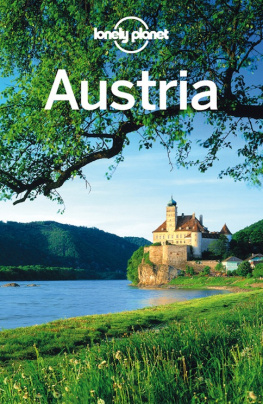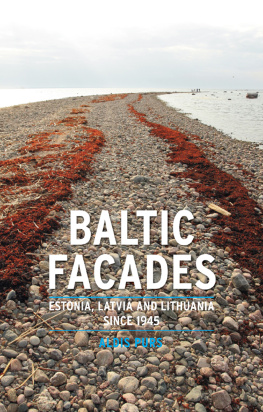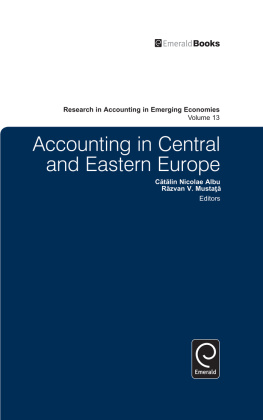Europes Third World
Modern Economic and Social History Series
General Editor: Derek H. Aldcroft
Titles in the series include:
Railways in Britain and the United States, 18301940
Studies in Economic and Business History
Geoffrey Channon
Exchange Rates and Economic Policy in the 20th Century
Edited by Ross E. Catterall and Derek H. Aldcroft
Trade Unions and the Economy: 18702000
Derek H. Aldcroft and Michael J. Oliver
Spain
A Modern European Economy
Joseph Harrison and David Corkill
Britain and the Economic Problem of the Cold War
The Political Economy and the Economic Impact of the British
Defence Effort, 19451955
Till Geiger
Industrial Reorganization and Government Policy in Interwar Britain
Julian Greaves
Merchants and Migrations
Germans and Americans in Connection, 17761835
Sam A. Mustafa
Industrial Clusters and Regional Business Networks in England, 17501970
Edited by John F. Wilson and Andrew Popp
Europes Third World
The European Periphery in the Interwar Years
DEREK H. ALDCROFT
University of Leicester
First published 2006 by Ashgate Publishing
Published 2016 by Routledge
2 Park Square, Milton Park, Abingdon, Oxon OX14 4RN
711 Third Avenue, New York, NY 10017, USA
Routledge is an imprint of the Taylor & Francis Group, an informa business
Copyright 2006 Derek H. Aldcroft
Derek H. Aldcroft has asserted his moral right under the Copyright, Designs and Patents Act, 1988, to be identified as the author of this work.
All rights reserved. No part of this book may be reprinted or reproduced or utilised in any form or by any electronic, mechanical, or other means, now known or hereafter invented, including photocopying and recording, or in any information storage or retrieval system, without permission in writing from the publishers.
Notice:
Product or corporate names may be trademarks or registered trademarks, and are used only for identification and explanation without intent to infringe.
British Library Cataloguing in Publication Data
Aldcroft, Derek Howard
Europes Third World: The European Periphery in the Interwar Years (Modern Economic and Social History).
1. Europe History 20th century. 2. Europe Economic conditions 20th century. 3. Europe Social conditions 20th century. I. Title
940.09724
US Library of Congress Cataloging in Publication Data
Aldcroft, Derek Howard,
Europes Third World: The European Periphery in the Interwar Years/Derek
H. Aldcroft.
p. cm. (Modern Economic and Social History)
Includes bibliographical references and index.
1. Europe History 20th century. 2. Europe Economic conditions 20th century. 3. Europe Social conditions 20th century. I. Title. II. Series:
Modern Economic and Social History Series.
D421.A425 2006
940.09724dc22 2005014115
ISBN 978 0 7546 0599 7 (hbk)
ISBN 978 1 3155 8115 6 (ebk)
For Steven
with sincere thanks
Contents
List of Tables
General Editors Preface
Economic and social history has been a flourishing subject of scholarly study during recent decades. Not only has the volume of literature increased enormously but the range of interest in time, space and subject matter has broadened considerably so that today there are many more sub-branches of the discipline which have developed considerable status in their own right.
One of the aims of this new series is to encourage the publication of scholarly monographs on any aspect of modern economic and social history. The geographical coverage is world-wide and contributions on non-British themes will be especially welcome. While emphasis will be placed on works embodying original research, it is also intended that the series should provide the opportunity to publish studies of a more general and thematic nature which offer a reappraisal or critical analysis of major issues of debate.
Derek H. Aldcroft
University of Leicester, UK
Acknowledgements
Over the years I have had much assistance from various academic colleagues in this country and abroad.
A special thanks is due to friend and colleague Dr Steven Morewood of the University of Birmingham who has done service beyond the call of duty during my writing of this book. He has read and commented in detail on all the chapters, provided numerous references and source material, and generally acted as an unpaid adviser. His encyclopaedic knowledge of the twentieth century has saved me from many blunders. To him I extend my sincere gratitude and it is fitting that this volume is dedicated to him. I hope that he is not too disappointed with the final product, but at least I can blame him for any errors that remain!
I should also like to thank another friend and colleague, Dr Michael Oliver, who, while not having seen this work, has over the years been a most energetic sounding board, a provider of sources and a sympathetic listener.
Dr Joseph Harrison of Manchester University and Professor David Corkill of Manchester Metropolitan University kindly read the chapter on Spain and Portugal and offered many helpful suggestions and insights.
I would also like to take this opportunity to thank Tom Gray, History Editor at Ashgate Publishing, who has for many years given his support and encouragement, and also done so much to make the Modern Economic and Social History series a success. One could not wish for a more patient and understanding colleague.
Derek H. Aldcroft
University of Leicester
Introductory Note
Thirteen European countries are the focus of the present study: Poland and Hungary, the Baltic states (Estonia, Latvia and Lithuania), the Balkan countries of Albania, Bulgaria, Romania and Yugoslavia, and the Southern European or Mediterranean countries of Greece, Portugal, Spain and Turkey. The last of these was largely out of Europe by the interwar period but, as explained in , but briefly they were all backward nations, with high agrarian components and income levels but a fraction of those of Western European countries.
From time to time economic historians and economists pose thought-provoking yet tantalising questions on the issue of comparative development, such as why isnt the whole world developed (Easterlin 1981), or why is the West so rich while much of the rest of the world is so poor (Landes 1999); or, at a more micro level, Hobsbawm ponders why Albania is not as wealthy as Switzerland, given the superficially similar characteristics of the two countries (Hobsbawm 1994). Tantalising questions because quick and straightforward answers are not readily to hand; they can only be answered, and even then not necessarily simply, after a great deal of research into the dynamics of comparative development.
We do not propose to take on the whole world in this volume; the limit is one continent, focusing on the marginal or peripheral countries which failed to participate fully in the drive to modern economic growth through to 1914. But the real testing time came in the transwar period, not simply because of the somewhat inauspicious conditions for economic development in that period, but because many countries had to cope with quite different geographical and administrative entities following the vast reconfiguration of the map of Europe after the First World War. Nearly all, apart from Spain and Portugal, were new creations or differently constituted states as a result of the postwar settlement. The Baltic states threw off the Russian yoke; Poland re-emerged after nearly a century and a half of foreign tutelage; Yugoslavia was a new creation; while Bulgaria, Hungary, Romania, Greece, Turkey and Albania experienced substantial territorial and population changes.


